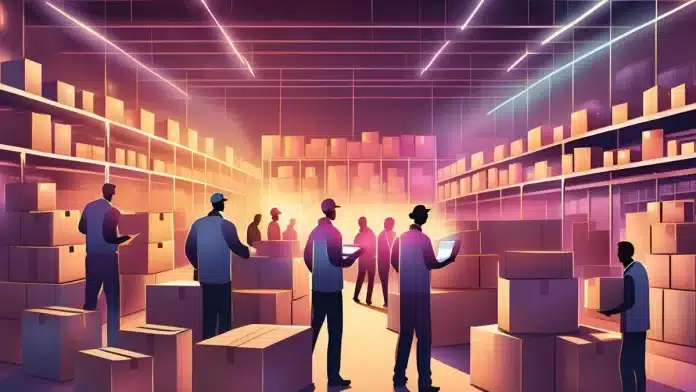In today’s fast-paced retail landscape, getting ahead of the curve means more than just stocking shelves, but also mastering the art of supply chain management. But what exactly does “supply chain management” mean for retailers, and why is it so important?
At its core, retail supply chain management is the strategic coordination of processes to ensure the right product reaches the right customer at the right time. For retailers, this is not just a behind-the-scenes operation but also the lifeblood of customer satisfaction and profitability.
Sa artikulong ito, tatalakayin natin kung bakit mahalaga ang isang mahusay na supply chain para sa tagumpay ng retail at kung paano ang tamang paraan ay maaaring magbago ng iyong negosyo.
Table of Contents

Key Takeaways
|
What is Retail Supply Chain Management?
Retail supply chain management is the process of coordinating the movement of products, information, and finances to ensure goods efficiently reach customers. It involves every step, from sourcing materials and manufacturing to warehousing, distribution, and delivery. By streamlining these processes, retailers can keep shelves stocked, reduce delays, and meet customer expectations seamlessly.
An effective supply chain, supported by a retail management system, is more than just logistics. It is a strategic advantage in a competitive market. With the right management, retailers can lower costs, improve efficiency, and enhance customer satisfaction, all essential for driving growth and staying ahead in the retail industry.
Why the Retail Supply Chain is Crucial for Business Success
The retail supply chain is more than just a logistics process, but a key factor that determines a business’s ability to thrive in a competitive environment. Here are some reasons why an efficient retail supply chain is critical to business success:
1. Timely product availability
A smooth and efficient retail supply chain ensures that products are available when customers need them, reducing the risk of stockouts or delays. This is crucial for meeting customer expectations and maintaining a steady flow of sales.
When customers can easily find the products they want, it boosts their satisfaction and encourages repeat purchases. On the other hand, stockouts can lead to frustration, lost sales, and even damage to a retailer’s reputation.
By having the right products in stock at the right time, businesses can build trust, increase customer loyalty, and ultimately drive long-term success.
2. Cost efficiency
Effective supply chain management plays a vital role in reducing unnecessary costs and improving overall cost efficiency for retailers. By optimizing inventory levels and eliminating excess stock, businesses can avoid costs associated with storage and wastage.
Streamlining operations also helps minimize delays and bottlenecks leading to faster production and distribution processes. As a result, retailers can reduce overhead costs, improve cash flow, and ultimately increase profit margins.
With a more cost-effective supply chain, businesses can reinvest the savings into other areas such as customer service or innovation, further enhancing their competitive advantage.
3. Faster response to market changes
A well-organized retail supply chain allows businesses to respond quickly to changes in the market such as shifts in consumer demand, emerging trends or unexpected disruptions in supply.
This flexibility is essential for staying competitive in an ever-changing retail environment. For example, if a new trend gains popularity a responsive supply chain enables retailers to source and deliver products that meet that demand quickly. Similarly, when faced with supply chain disruptions such as transportation delays or shortages, an efficient system helps businesses adapt quickly, minimizing the impact on customers.
By being able to react swiftly and effectively, retailers can maintain customer satisfaction and stay ahead of their competitors.
4. Improved customer experience
An efficient retail supply chain plays a crucial role in ensuring that products are delivered on time and in good condition, which directly impacts the customer experience. When customers receive their orders quickly and without issues, it builds trust and satisfaction, encouraging them to return for future purchases.
On the other hand, delays or damaged products can lead to frustration and dissatisfaction, which may cause customers to seek alternatives. By consistently meeting customer expectations with timely deliveries and high-quality products, businesses can foster loyalty and generate positive word-of-mouth, ultimately leading to increased sales and long-term success.
Critical Challenges in Retail Supply Chain Management
Retailers must navigate a variety of obstacles to ensure their supply chains operate smoothly. Below are some of the critical challenges faced by retailers today:
- Inventory management: Managing inventory efficiently is one of the biggest challenges for retailers. Overstocking ties up capital and increases storage costs, while understocking can lead to stockouts and missed sales. Finding the right balance is crucial for maintaining a smooth supply chain and meeting customer demands without incurring unnecessary costs.
- Supply chain disruptions: Unexpected events such as natural disasters, strikes, or transportation issues can disrupt the supply chain and cause delays. Retailers must have contingency plans in place to manage these disruptions and minimize their impact on product availability and customer satisfaction.
- Cost increase: The cost of raw materials, transportation, and labour can fluctuate, making it difficult for retailers to control expenses. Retailers need to find ways to optimize their supply chain processes to reduce costs without compromising product quality or customer service.
- Demand forecasting: Accurately predicting customer demand is a significant challenge for retailers. Incorrect demand forecasts can result in excess or shortage of inventory, both of which can negatively impact the bottom line. Retailers need to rely on data-driven insights and advanced technologies, such as retail management software to improve forecasting accuracy and streamline inventory management.
Benefits of an Efficient Retail Supply Chain for Businesses

An efficient retail supply chain offers many benefits to businesses, helping them streamline operations, reduce costs, and improve overall performance. Here are some of the key advantages:
- Cost savings: An efficient supply chain helps businesses lower costs by better managing inventory and reducing waste. By cutting down on excess stock and improving logistics, retailers can save on storage, transportation, and other expenses, leading to higher profits.
- Improved customer satisfaction: On-time deliveries, accurate orders, and fewer stock-outs help build trust and encourage repeat business, resulting in long-term growth.
- Faster time to market: Efficient supply chains enable businesses to respond quickly to changing market demands. With streamlined processes and faster product delivery, retailers can get their products to market quicker, giving them a competitive advantage and allowing them to capitalize on new trends faster.
- Better risk management: An efficient supply chain can help businesses better manage risks by identifying potential disruptions and allowing for proactive solutions. With the right systems in place, retailers can minimize the impact of unforeseen events, such as supplier delays or logistics issues, ensuring business continuity.
Effective Strategies to Optimize Your Retail Supply Chain
To optimize your retail supply chain, focusing on key strategies is essential for improving efficiency and reducing costs. Here are the four most important strategies to consider.
- Achieve real time supply chain visibility: Visibility is a cornerstone of supply chain efficiency. By monitoring inventory levels, supplier performance, and shipment progress in real-time, businesses can identify and resolve issues quickly. HashMicro’s ERP system offers advanced visibility tools, allowing your team to access up-to-date insights and make informed decisions, ensuring smooth operations.
- Automate inventory management: Manual inventory tracking can lead to errors, inefficiencies, and missed opportunities. Automation streamlines inventory processes by tracking stock, forecasting demand, and triggering timely reorder alerts. HashMicro’s Inventory Management Software enables seamless inventory automation, helping your company maintain optimal stock levels while reducing waste.
- Enhance supplier relationships: Reliable suppliers are essential for a seamless supply chain. Strengthening supplier collaboration ensures timely deliveries, better communication, and stronger partnerships. With HashMicro’s Supplier Management System, businesses can automate procurement processes, monitor supplier performance, and build more efficient supply chain networks.
- Optimize logistics and distribution: Logistics and distribution play a critical role in meeting customer expectations and controlling costs. By optimizing delivery routes, tracking shipments, and managing transportation expenses, businesses can ensure faster, more reliable deliveries. HashMicro’s Transport Management System provides cutting-edge features that enhance logistics efficiency, improving service quality and reducing costs.
If you want to learn more about HashMicro software that simplifies retail business operations, click the banner below.

Conclusion
Supply Chain Management (SCM) plays a crucial role for retailers, enabling them to streamline operations, reduce costs, and deliver products efficiently to customers. By adopting effective SCM practices, retailers can maintain a competitive edge and ensure smooth business operations.
HashMicro’s comprehensive software solutions provide powerful tools to optimize every aspect of your supply chain, from inventory management to logistics and supplier collaboration.
To better understand how our technology can enhance your operations, we invite you to try our free demo and see how HashMicro can help transform your retail supply chain.

FAQ Retail Supply Chain
-
How does technology help in managing a retail supply chain?
Technology enables real-time tracking, data analysis, automation, and better communication across the supply chain, leading to improved efficiency and decision making.
-
What role does inventory management play in the retail supply chain?
Inventory management ensures the right products are available at the right time, minimizing stockouts and overstocking while optimizing storage and costs.
-
What is demand forecasting in a retail supply chain?
Demand forecasting involves predicting future customer demand using historical data, market trends, and analytics. It helps businesses plan inventory and avoid overstock or stockout situations.
{
“@context”: “https://schema.org”,
“@type”: “FAQPage”,
“mainEntity”: [{
“@type”: “Question”,
“name”: “How does technology help in managing a retail supply chain?”,
“acceptedAnswer”: {
“@type”: “Answer”,
“text”: “Technology enables real-time tracking, data analysis, automation, and better communication across the supply chain, leading to improved efficiency and decision making.”
}
},{
“@type”: “Question”,
“name”: “What role does inventory management play in the retail supply chain?”,
“acceptedAnswer”: {
“@type”: “Answer”,
“text”: “Inventory management ensures the right products are available at the right time, minimizing stockouts and overstocking while optimizing storage and costs.”
}
},{
“@type”: “Question”,
“name”: “What is demand forecasting in a retail supply chain?”,
“acceptedAnswer”: {
“@type”: “Answer”,
“text”: “Demand forecasting involves predicting future customer demand using historical data, market trends, and analytics. It helps businesses plan inventory and avoid overstock or stockout situations.”
}
}]
}



































